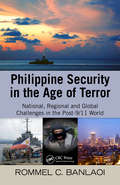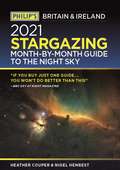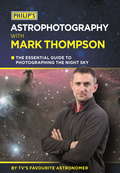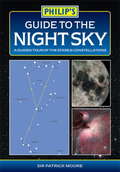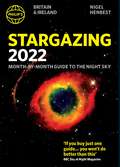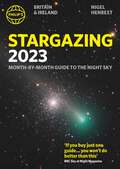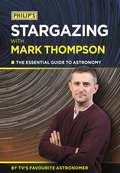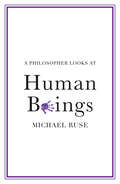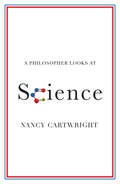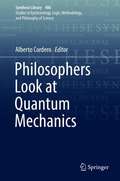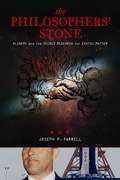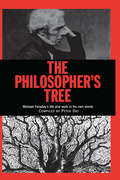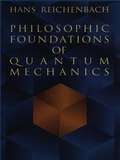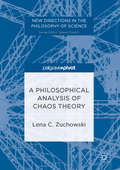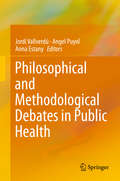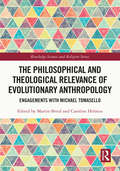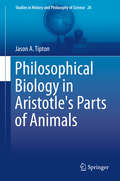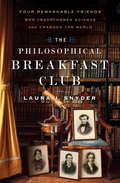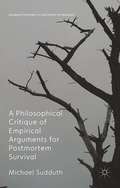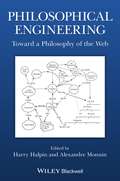- Table View
- List View
Philippine Security in the Age of Terror: National, Regional, and Global Challenges in the Post-9/11 World
by Rommel BanlaoiAs the twelfth most populous nation, the Philippines diverse religious and ethnic population makes it an ideal example of the changing tenet of what is deemed national security post 9/11. Issues previously considered social or public are now viewed as security issues. Food production is now analyzed in the context of food security and environmenta
Philip's 2021 Stargazing Month-by-Month Guide to the Night Sky in Britain & Ireland (Philip's Stargazing)
by Nigel Henbest"If you buy just one guide... you won't do better than this" BBC Sky at Night Magazine"You're very much in the dark without this illuminating superstar of a guide." Popular Astronomy"I will continue to enjoy 'Philip's Stargazing' as the months go by" Helen Sharman, Astronaut "Very useful indeed" Chris Lintott, Sky at Night presenterDiscover the latest in star gazing with the new and definitive guide to the night sky.Whether you're a seasoned astronomer or just starting out, Philip's Stargazing 2021 is the only book you'll need. Compiled by experts and specially designed for use in Britain and Ireland, Stargazing 2021 acts as a handily illustrated and comprehensive companion.- 12 Brand-New Maps for year-round astronomical discovery- Month-to-Month informationDaily Moon Phase Calendar, highlighting special lunar events throughout the year- Planet Watch for ideal viewing days in 2021- Avoid light pollution with our detailed Dark Sky Map- Expert advice and insight throughout from internationally renowned Professors Couper and Henbest- Using Binoculars - Stargazing recommendations from expert Robin Scagell- Perfect for home use during lockdown- Complete calendar of major astronomical events, including the Top 20 Sky Sights of 2021- Jargon Buster, explaining common or confusing terms - The planets' movements explained from solar and lunar eclipses to meteor showers and comets
Philip's 2021 Stargazing Month-by-Month Guide to the Night Sky in Britain & Ireland
by Nigel Henbest Heather Couper"If you buy just one guide... you won't do better than this" BBC Sky at Night Magazine"You're very much in the dark without this illuminating superstar of a guide." Popular Astronomy"I will continue to enjoy 'Philip's Stargazing' as the months go by" Helen Sharman, Astronaut "Very useful indeed" Chris Lintott, Sky at Night presenterDiscover the latest in star gazing with the new and definitive guide to the night sky.Whether you're a seasoned astronomer or just starting out, Philip's Stargazing 2021 is the only book you'll need. Compiled by experts and specially designed for use in Britain and Ireland, Stargazing 2021 acts as a handily illustrated and comprehensive companion.- 12 Brand-New Maps for year-round astronomical discovery- Month-to-Month informationDaily Moon Phase Calendar, highlighting special lunar events throughout the year- Planet Watch for ideal viewing days in 2021- Avoid light pollution with our detailed Dark Sky Map- Expert advice and insight throughout from internationally renowned Professors Couper and Henbest- Using Binoculars - Stargazing recommendations from expert Robin Scagell- Perfect for home use during lockdown- Complete calendar of major astronomical events, including the Top 20 Sky Sights of 2021- Jargon Buster, explaining common or confusing terms - The planets' movements explained from solar and lunar eclipses to meteor showers and comets
Philip's Astrophotography With Mark Thompson: The Essential Guide To Photographing The Night Sky By TV's Favourite Astronomer
by Mark ThompsonPhilip's Astrophotography With Mark Thompson is an essential guide for anyone wishing to photograph or image the stars and planets, written by TV's favourite astronomer.For many people, looking at the sky is not enough and they would love to try and capture what they can see. Until a few years ago, capturing astronomical images was fraught with many challenges, but with the development of digital cameras replacing film, things have become much easier and great astronomical images are now within the reach of even the most novice stargazer.Mark Thompson has spent many years capturing the beauty of the night sky, first with film and now with the digital camera, and has discovered and overcome many of the pitfalls. This book takes the reader on a journey through the world of capturing astronomical images from using the humble mobile phone to specialist cameras, brought to life with Mark's personal experiences and many of his own astronomical images.
Philip's Guide to the Night Sky: A guided tour of the stars and constellations (Philip's Guide to...)
by Sir Patrick MooreFind your way around the night sky with this handy guide to stargazing for the complete novice. In Philip's Guide to the Night Sky, Sir Patrick Moore explains how to find the most famous constellations and the brightest stars, and when to look for them. Clear star maps, showing stars visible to the naked eye, help you to navigate the skies. The maps are suitable for use in Britain, Ireland, northern Europe and Canada.Sir Patrick introduces the wonders of the night sky to absolute beginners in his characteristically entertaining and informative style. The Moon, the planets, the Sun and the stars are explained in non-technical language, while the constellations are described with the help of star maps and tables.The four main chapters in Philip's Guide to the Night Sky are devoted to what's on view in each season of the year. The information is appropriate for observers in Britain and Ireland, northern Europe and Canada; it will also be helpful a little outside these latitudes. Using prominent patterns, such as the Plough and Orion, Sir Patrick teaches the reader to 'star-hop' from constellation to constellation, thus learning to navigate the night sky. Star maps and photographs illustrate and clarify what will be on view. Philip's Guide to the Night Sky is an ideal introduction to stargazing, suitable for all ages and with no need for anything more technical than the naked eye.
Philip's Stargazing 2022 Month-by-Month Guide to the Night Sky in Britain & Ireland (Philip's Stargazing)
by Nigel Henbest<p>"If you buy just one guide...you won't do better than this" - BBC Sky at Night Magazine<p> <p>"I will continue to enjoy 'Philip's Stargazing' as the months go by" - Helen Sharman, Astronaut<p> <p>"Very useful indeed" - Chris Lintott, Sky at Night presenter<p> <p>Discover the latest in stargazing with the new and definitive guide to the night sky. Whether you're a seasoned astronomer or just starting out, Philip's Stargazing 2022 is the only book you'll need. Compiled by experts and specially designed for use in Britain and Ireland, Stargazing 2022 acts as a handily illustrated and comprehensive companion.<p> <p>- 12 Brand-New Maps for year-round astronomical discovery- Month-to-Month information. Daily Moon Phase Calendar, highlighting special lunar events throughout the year- Planet Watch for ideal viewing days in 2022- Avoid light pollution with our detailed Dark Sky Map- Expert advice and insight throughout from internationally renowned Professor Nigel Henbest- A 'Behind the Scenes' look at astrophotography from expert Robin Scagell- Complete calendar of major astronomical events, including the Top 20 Sky Sights of 2022- Jargon Buster, explaining common or confusing terms - The planets' movements explained from solar and lunar eclipses to meteor showers and comets.<p>
Philip's Stargazing 2023 Month-by-Month Guide to the Night Sky Britain & Ireland (Philip's Stargazing)
by Nigel Henbest"If you buy just one guide...you won't do better than this" BBC Sky at Night Magazine"I will continue to enjoy 'Philip's Stargazing' as the months go by" Helen Sharman, Astronaut"Very useful indeed" Chris Lintott, Sky at Night presenterNow including the top astronomical places to visit, star festivals and the latest on star parties in Britain and Ireland, the new 2023 edition is totally up-to-date for exploring the wonder of the night skies, month-by-month and day-by-day. Whether you're a seasoned astronomer or just starting out, Philip's Stargazing 2023 is the only book you'll need. Compiled by experts and specially designed for easy and daily use, Stargazing 2023 acts as a handily illustrated and comprehensive companion.- 12 updated sky charts for year-round astronomical discovery- Month-to-Month information. Daily Moon Phase Calendar, highlighting special lunar events throughout the year- Planet Watch for ideal viewing days in 2023- The best places to experience Dark Skies, along with the latest on Star Festivals and Star Parties- Top places to visit for astronomical insights- Expert advice and insight throughout from internationally renowned Prof Nigel Henbest- The latest on electronic telescopes from expert Robin Scagell- Complete calendar of major astronomical events, including the Top 20 Sky Sights of 2023- Jargon Buster, explaining common or confusing terms - The planets' movements explained from solar and lunar eclipses to meteor showers and comets
Philip's Stargazing With Mark Thompson: The Essential Guide To Astronomy By TV's Favourite Astronomer
by Mark ThompsonPhilip's Stargazing With Mark Thompson provides the perfect introduction to the fascinating hobby of astronomy for beginners, written by TV's favourite astronomer.With 30 years' experience in observational astronomy and helping hundreds of newcomers get started in their new hobby, Mark Thompson takes everything he has learned and leads his readers skilfully through their early stargazing experiences in this brand-new book - Philip's Stargazing With Mark Thompson. He provides a wealth of knowledge, with valuable hints and tips to aid beginners in their first steps in astronomy. Not only does Mark demonstrate great observational techniques and how to find the brighter objects in the sky, but he guides his readers through the important steps of choosing and using a telescope.This is a book that will not only act as a guide to the novice astronomer but, by drawing on Mark's own experiences, will be a companion to share in the wonders of the night sky.
Philip's Stargazing With Mark Thompson: The Essential Guide To Astronomy By TV's Favourite Astronomer
by Mark ThompsonPhilip's Stargazing With Mark Thompson provides the perfect introduction to the fascinating hobby of astronomy for beginners, written by TV's favourite astronomer. With 30 years' experience in observational astronomy and helping hundreds of newcomers get started in their new hobby, Mark Thompson takes everything he has learned and leads his readers skilfully through their early stargazing experiences in this brand-new book - Philip's Stargazing With Mark Thompson. He provides a wealth of knowledge, with valuable hints and tips to aid beginners in their first steps in astronomy. Not only does Mark demonstrate great observational techniques and how to find the brighter objects in the sky, but he guides his readers through the important steps of choosing and using a telescope. This is a book that will not only act as a guide to the novice astronomer but, by drawing on Mark's own experiences, will be a companion to share in the wonders of the night sky.
A Philosopher Looks at Human Beings (A Philosopher Looks At)
by Michael RuseWhy do we think ourselves superior to all other animals? Are we right to think so? In this book, Michael Ruse explores these questions in religion, science and philosophy. Some people think that the world is an organism - and that humans, as its highest part, have a natural value (this view appeals particularly to people of religion). Others think that the world is a machine - and that we therefore have responsibility for making our own value judgements (including judgements about ourselves). Ruse provides a compelling analysis of these two rival views and the age-old conflict between them. In a wide-ranging and fascinating discussion, he draws on Darwinism and existentialism to argue that only the view that the world is a machine does justice to our humanity. This new series offers short and personal perspectives by expert thinkers on topics that we all encounter in our everyday lives.
A Philosopher Looks at Science
by Nancy CartwrightWhat is science and what can it do? Nancy Cartwright here takes issue with three common images of science: that it amounts to the combination of theory and experiment; that all science is basically reducible to physics; and that science and the natural world which it pictures are deterministic. The author's innovative and thoughtful book draws on examples from the physical, life, and social sciences alike, and focuses on all the products of science – not just experiments or theories – and how they work together. She reveals just what it is that makes science ultimately reliable, and how this reliability is nevertheless still compatible with a view of nature as more responsive to human change than we might think. Her book is a call for greater intellectual humility by and within scientific institutions. It will have strong appeal to anyone who thinks about science and how it is practised in society.
Philosophers Look at Quantum Mechanics (Synthese Library #406)
by Alberto CorderoThis edited volume explores the philosophical implications of quantum mechanics. It features papers from venues of the International Ontology Congress (IOC) up to 2016. IOC is a worldwide platform for dialogue and reflection on the interactions between science and philosophy.The collection features philosophers as well as physicists, including David Albert, Harvey Brown, Jeffrey Bub, Otávio Bueno, James Cushing, Steven French, Victor Gomez-Pin, Carl Hoefer, Simon Kochen, Peter Lewis, Tim Maudlin, Peter Mittlestatedt, Roland Omnès, Juha Saatsi, Albert Solé, David Wallace, and Anton Zeilinger.Since the early days of quantum mechanics, philosophers have studied the subject with growing technical skill and fruitfulness. Their efforts have unveiled intellectual bridges between physics and philosophy. These connections have helped fuel the contemporary debate about the scope and limits of realism and understanding in the interpretation of physical theories and scientific theories in general. The philosophical analysis of quantum mechanics is now one of the most sophisticated and productive areas in contemporary philosophy, as the papers in this collection illustrate.
The Philosopher's Stone
by Joseph P. FarrellProlific author Joseph P. Farrell, who commands a growing and devoted audience on Coast to Coast AM, Erskine Overnight, and other programs, initiates his Feral House association with The Philosopher's Stone, in which he demonstrates the connections of modern physics and ancient alchemy by investigating monatomic gold, the work of Russian astrophysicist Nikolai Kozyrev, and the fuel for the mysterious Nazi "Bell" device, Serum 525.Farrell's previous books investigated the scientific and astronomical implications of ancient monuments and the secret space operations of the Nazis who were brought into NASA to continue their highly classified research as a result of "Operation Paperclip." The author is now working with best-selling authors Richard C. Hoagland and Mike Bara on a book about secret American space programs.Chapters within The Philosopher's Stone include:The alchemical view of the physical mediumTransmutations and timeDavid Hudson's Monatomic GoldThe Platinum Group Metals and High Spin State AtomsAn Alchemical Examination of the Soviet Red Mercury LegendThe Physics of Rotation: Dr. Nikolai KozyrevH-Bombs and Torsion PhysicsThe Greater German Alchemical ReichNazis, Lasers, and Isotope EnrichmentThe Bell and Serum 525
The Philosopher's Tree: A Selection of Michael Faraday's Writings
by Peter DayThis book provides a comprehensive selection of Michael Faraday's writings, taken from all aspects of his life, intimate and public. It is designed to show the relationships between his many activities, especially with the Royal Institution, for whose bicentenary this collection is published.
Philosophic Foundations of Quantum Mechanics
by Hans ReichenbachPhysics concerns direct analysis of the physical world, while philosophy analyzes knowledge about the physical world. This volume combines both disciplines for a philosophical interpretation of quantum physics -- an interpretation free from the imprecision of metaphysics, offering a view of the atomic world and its quantum mechanical results as concrete as the visible everyday world.Written by an internationally renowned philosopher who specialized in symbolic logic and the theory of relativity, this approach consists of three parts. The first section, which requires no background in math or physics, reviews the basics of quantum mechanics, outlining their philosophical interpretation and summarizing their results. The second part, which presupposes a knowledge of calculus, outlines the mathematical methods of quantum mechanics; and the third part blends the philosophical ideas of the first part and the mathematical formulations of the second part to develop a variety of interpretations of quantum mechanics. The author presents in-depth discussions of each interpretation, constructing a conclusion in terms of three-valued logic that offers readers a satisfactory logical form of quantum mechanics.Focusing on clarification of concepts rather than developing problem-solving skills, this volume will prove enlightening to students of mathematics, physics, and the other sciences.
A Philosophical Analysis of Chaos Theory
by Lena C. ZuchowskiThis book provides an analysis of the construction, diagnosis (as chaotic) and evaluation of models in chaos theory. It contains a detailed look at the interaction of the different models used in chaos theory and analyses how these models influence the way chaos is defined. Furthermore, the book discusses the conditions for the occurrence of chaos and the detection of chaos in nature.
Philosophical and Methodological Debates in Public Health
by Jordi Vallverdú Angel Puyol Anna EstanyThis interdisciplinary volume gathers selected, refereed contributions on various aspects of public health from several disciplines and research fields, including the philosophy of science, epidemiology, statistics and ethics. The contributions were originally presented at the 1st Barcelona conference of “Philosophy of Public Health” (5th – 7th May 2016). This book is intended for researchers interested in public health and the contemporary debates surrounding it.
The Philosophical and Theological Relevance of Evolutionary Anthropology: Engagements with Michael Tomasello (Routledge Science and Religion Series)
by Martin Breul Caroline HelmusThis book explores the philosophical and theological significance of evolutionary anthropology and includes diverse approaches to the relationship between evolution, culture, and religion. Particular emphasis is placed on the work of Michael Tomasello, who contributes an opening chapter that tackles the role of religion in his natural history of human thinking and human morality. The first section of the book considers the philosophical foundations of evolutionary anthropology and shows that evolutionary anthropology is open to a multitude of philosophical analyses. The second part offers theological perspectives on the relationship between evolutionary and theological anthropology and between evolution and religion. The volume also reflects more broadly on the complex relationship between religion and science in the contexts of late-modern societies. It makes a significant contribution to the religion and science debate and offers performative evidence that an interdisciplinary discussion between theologians, philosophers, and natural scientists is feasible.
A Philosophical Approach to MOND: Assessing the Milgromian Research Program in Cosmology
by David MerrittDark matter is a fundamental component of the standard cosmological model, but in spite of four decades of increasingly sensitive searches, no-one has yet detected a single dark-matter particle in the laboratory. An alternative cosmological paradigm exists: MOND (MOdified Newtonian Dynamics). Observations explained in the standard model by postulating dark matter are described in MOND by proposing a modification of Newton's laws of motion. Both MOND and the standard model have had successes and failures – but only MOND has repeatedly predicted observational facts in advance of their discovery. In this volume, David Merritt outlines why such predictions are considered by many philosophers of science to be the 'gold standard' when it comes to judging a theory's validity. In a world where the standard model receives most attention, the author applies criteria from the philosophy of science to assess, in a systematic way, the viability of this alternative cosmological paradigm.
A Philosophical Approach to Quantum Field Theory
by Hans Christian ÖttingerThis text presents an intuitive and robust mathematical image of fundamental particle physics based on a novel approach to quantum field theory, which is guided by four carefully motivated metaphysical postulates. In particular, the book explores a dissipative approach to quantum field theory, which is illustrated for scalar field theory and quantum electrodynamics, and proposes an attractive explanation of the Planck scale in quantum gravity. Offering a radically new perspective on this topic, the book focuses on the conceptual foundations of quantum field theory and ontological questions. It also suggests a new stochastic simulation technique in quantum field theory which is complementary to existing ones. Encouraging rigor in a field containing many mathematical subtleties and pitfalls this text is a helpful companion for students of physics and philosophers interested in quantum field theory, and it allows readers to gain an intuitive rather than a formal understanding. Applies philosophical ideas to develop a new and unique perspective on various approaches to quantum field theory. Challenges and supports the reader in recognizing the conceptual foundations of quantum field theory. Formulates quantum field theory in the setting of irreversible dynamics to account for particle creation and annihilation processes that are completely beyond our control.
Philosophical Biology in Aristotle's Parts of Animals
by Jason A. TiptonThis book provides a detailed analysis of Aristotle's Parts of Animals. It presents the wealth of information provided in the biological works of Aristotle and revisits the detailed natural history observations that inform, and in many ways penetrate, the philosophical argument. It raises the question of how easy it is to clearly distinguish between what some might describe as "merely" biological and the philosophical. It explores the notion and consequences of describing the activity in which Aristotle is engaged as philosophical biology. The book examines such questions as: do readers of Aristotle have in mind organisms like Ascidians or Holothurians when trying to understand Aristotle's argument regarding plant-like animals? Do they need the phenomena in front of them to understand the terms of the philosophical argument in a richer way? The discussion of plant-like animals is important in Aristotle because of the question about the continuum between plant and animal life. Where does Aristotle draw the line? Plant-like animals bring this question into focus and demonstrate the indeterminacy of any potential solution to the division. This analysis of Parts of Animals shows that the study of the nature of the organic world was Aristotle's way into such ontological problems as the relationship between matter and form, or form and function, or the heterogeneity of the many different kinds of being.
The Philosophical Breakfast Club: Four Remarkable Friends Who Transformed Science and Changed the World
by Laura J. SnyderThe Philosophical Breakfast Club recounts the life and work of four men who met as students at Cambridge University: Charles Babbage, John Herschel, William Whewell, and Richard Jones. Recognizing that they shared a love of science (as well as good food and drink) they began to meet on Sunday mornings to talk about the state of science in Britain and the world at large. Inspired by the great 17th century scientific reformer and political figure Francis Bacon—another former student of Cambridge—the Philosophical Breakfast Club plotted to bring about a new scientific revolution. And to a remarkable extent, they succeeded, even in ways they never intended. Historian of science and philosopher Laura J. Snyder exposes the political passions, religious impulses, friendships, rivalries, and love of knowledge—and power—that drove these extraordinary men. Whewell (who not only invented the word “scientist,” but also founded the fields of crystallography, mathematical economics, and the science of tides), Babbage (a mathematical genius who invented the modern computer), Herschel (who mapped the skies of the Southern Hemisphere and contributed to the invention of photography), and Jones (a curate who shaped the science of economics) were at the vanguard of the modernization of science. This absorbing narrative of people, science and ideas chronicles the intellectual revolution inaugurated by these men, one that continues to mold our understanding of the world around us and of our place within it. Drawing upon the voluminous correspondence between the four men over the fifty years of their work, Laura J. Snyder shows how friendship worked to spur the men on to greater accomplishments, and how it enabled them to transform science and help create the modern world.
The Philosophical Breakfast Club
by Laura J. SnyderThe Philosophical Breakfast Club recounts the life and work of four men who met as students at Cambridge University: Charles Babbage, John Herschel, William Whewell, and Richard Jones. Recognizing that they shared a love of science (as well as good food and drink) they began to meet on Sunday mornings to talk about the state of science in Britain and the world at large. Inspired by the great 17th century scientific reformer and political figure Francis Bacon--another former student of Cambridge--the Philosophical Breakfast Club plotted to bring about a new scientific revolution. And to a remarkable extent, they succeeded, even in ways they never intended. Historian of science and philosopher Laura J. Snyder exposes the political passions, religious impulses, friendships, rivalries, and love of knowledge--and power--that drove these extraordinary men. Whewell (who not only invented the word "scientist," but also founded the fields of crystallography, mathematical economics, and the science of tides), Babbage (a mathematical genius who invented the modern computer), Herschel (who mapped the skies of the Southern Hemisphere and contributed to the invention of photography), and Jones (a curate who shaped the science of economics) were at the vanguard of the modernization of science. This absorbing narrative of people, science and ideas chronicles the intellectual revolution inaugurated by these men, one that continues to mold our understanding of the world around us and of our place within it. Drawing upon the voluminous correspondence between the four men over the fifty years of their work, Laura J. Snyder shows how friendship worked to spur the men on to greater accomplishments, and how it enabled them to transform science and help create the modern world.From the Hardcover edition.
A Philosophical Critique of Empirical Arguments for Postmortem Survival (Palgrave Frontiers in Philosophy of Religion)
by Michael SudduthSudduth provides a critical exploration of classical empirical arguments for survival arguments that purport to show that data collected from ostensibly paranormal phenomena constitute good evidence for the survival of the self after death. Utilizing the conceptual tools of formal epistemology, he argues that classical arguments are unsuccessful.
Philosophical Engineering: Toward a Philosophy of the Web (Metaphilosophy)
by Harry Halpin Alexandre MonninThis is the first interdisciplinary exploration of the philosophical foundations of the Web, a new area of inquiry that has important implications across a range of domains. Contains twelve essays that bridge the fields of philosophy, cognitive science, and phenomenology Tackles questions such as the impact of Google on intelligence and epistemology, the philosophical status of digital objects, ethics on the Web, semantic and ontological changes caused by the Web, and the potential of the Web to serve as a genuine cognitive extension Brings together insightful new scholarship from well-known analytic and continental philosophers, such as Andy Clark and Bernard Stiegler, as well as rising scholars in “digital native” philosophy and engineering Includes an interview with Tim Berners-Lee, the inventor of the Web
